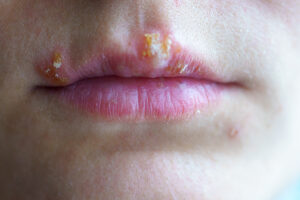Antiviral drugs against herpes often develop resistance, but a new antiviral drug combats herpes and resistant herpes. A publication from researchers at the Lund University in Sweden on July 24, 2020 provided a different approach. Alex Evilevitch, Associate Professor and senior lecturer at Lund University investigated viruses and their internal pressure. They found that herpes virus has an internal pressure of 20 atmospheres.
This is 4-times the pressure of a Champagne bottle. This is due to tightly packaged genetic material inside a thin protein shell, the capsid. When the herpes virus enters a cell, the tightly packed virus particle explodes and the gene material of the virus gets injected into the cell nucleus. The cell is tricked into becoming a virus factory producing more herpes viruses.
Herpes virus infections develop resistance in immunocompromised patients, in newborn children, HIV patients, cancer patients or patients who had organ transplantations.
Anti-herpes treatment with small molecules
Dr. Evilevitch and his team found small molecules that can penetrate into the herpes virus, turning off the pressure in the virus and not damaging the cell. The common antiviral drug for herpes infections is Acyclovir, but these antiviral small molecules are several times more effective in killing the virus than this drug. The structure and physical properties of the whole herpes family is the same. This new treatment method has the advantage that it is effective against all varieties of herpes, even resistant strains. Dr. Evilevitch said that drugs against viral infections are very specialized and directed against the viral proteins. When the virus mutates and becomes drug-resistant the antiviral drugs become ineffective. However, when you succeed affecting the physical properties of the virus, such as lowering the pressure inside the virus shell, with this method the herpes viruses still succumb to the treatment despite the drug-resistance.
Statistics about herpes simplex virus
Herpes simplex virus in immunocompetent people is rarely resistant to Acyclovir (only in 0.1% to 0.6% cases). But in immunocompromised people 3.5% to 10% of herpes simplex cases are resistant to Acyclovir. In clinical surveys researchers report of up to 36% of cases of herpes simplex that are resistant to Acyclovir. You can see that an alternative treatment against herpes involving smaller molecules that treats regular herpes and also resistant herpes would be very useful.
Dr. Evilevitch is doing research together with the National Institutes of Health in the United States in order to develop an oral medication that will treat resistant herpes.
Conclusion
A new antiviral drug combats herpes and resistant herpes. A publication from researchers at the Lund University in Sweden on July 24, 2020 provided a different approach. They found that herpes virus has an internal pressure of 20 atmospheres. This is due to tightly packaged genetic material inside a thin protein shell, the capsid. When the herpes virus enters a cell, the tightly packed virus particle explodes, and the gene material of the virus gets injected into the cell nucleus. Dr. Evilevitch and his team found small molecules that can penetrate into the herpes virus, turning off the pressure in the virus without doing damage to the cell.
Researchers work on a drug development that will lower the pressure inside the herpes virus
Compared to the drug Acyclovir these antiviral small molecules are several times more effective in killing the virus. The new smaller molecule drug treats drug resistant herpes and all strains of regular herpes. Dr. Evilevitch is doing research together with the National Institutes of Health in the United States. Together they want to develop a medication that will treat resistant herpes.







